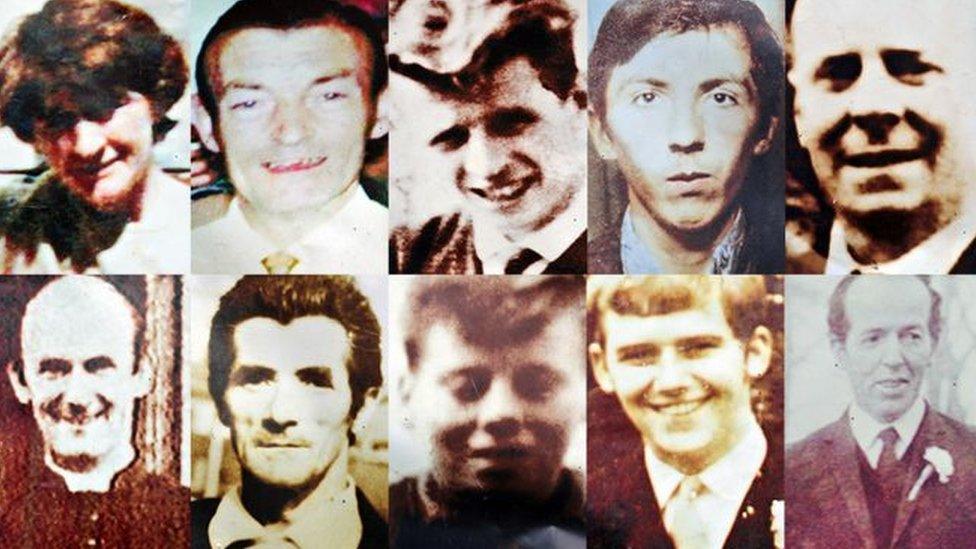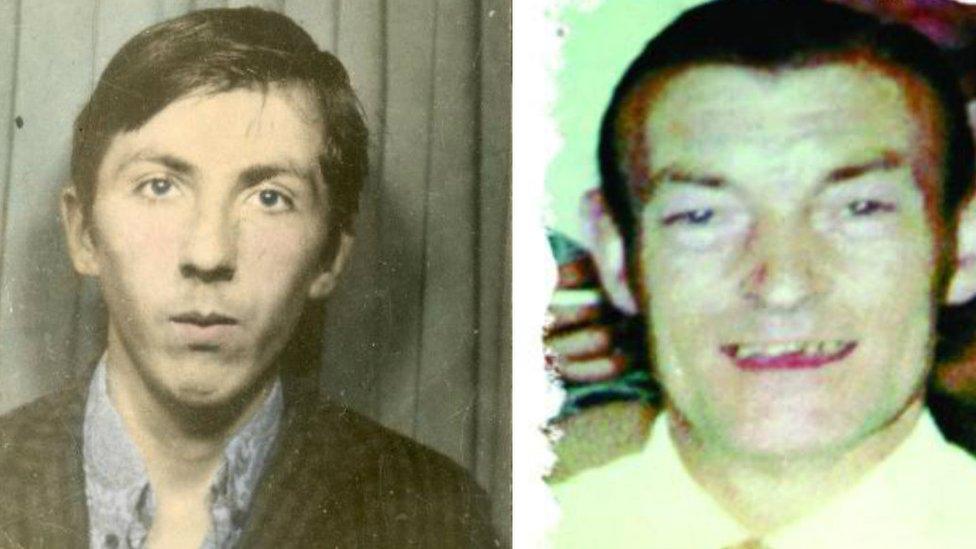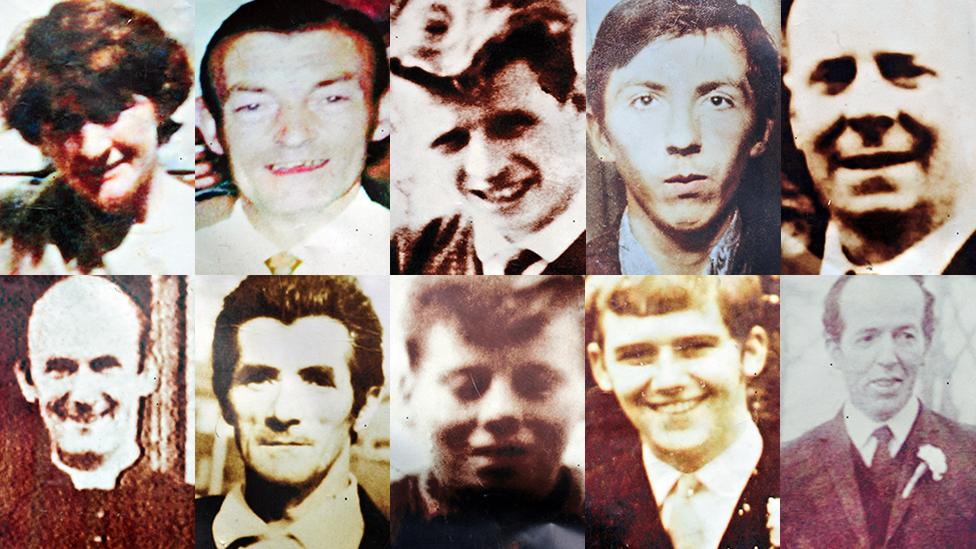Ballymurphy inquest: Witness casts doubt on soldier statement
- Published

An inquest is examining the deaths of 10 people killed in shootings at Ballymurphy in August 1971
A military witness at an inquest into the deaths of 10 people in west Belfast in 1971 has cast doubt on an account told by an unidentifiable soldier.
The inquest is examining the shootings in Ballymurphy in August that year.
Witness M546 was a lance corporal in charge of a section in 7 Platoon, C Company, 1 Para on 11 August 1971.
With his men he was part of the advance down Upper Whiterock Road from Black Mountain that morning.
On reading the statement given by Soldier B in 1972 and read out in court earlier this week, M546 said: "I'm amazed".
Although Soldier B's identity was known to Northern Ireland's judicial authorities in 1972, his name has been lost.
'Doing a Walter Mitty'
Soldier B had described firing six shots at two men who, he said, had a submachine gun and a pistol.
But M546 said he could not remember any shooting and felt that if such a thing had happened he and his fellow soldiers would have definitely known about it.
"He's doing a Walter Mitty," he told the court.
"It wouldn't happen - it's not the way we worked."
And he added later: "Why did I miss all of this if I was there?"
M546 described finding a civilian casualty with a severe injury to his right side and covered in blood, and said he radioed for a medic to come and treat the man.
He remembers being surprised to find a civilian with such injuries.
"Can I say," he told the court, "it's not nice to see someone like that, in that condition."
'Commended for treatment call'
In its latest phase, the inquest is looking at the deaths of John Laverty, 20, and Joseph Corr, 43.
A barrister for the family of Joseph Corr said they believe their loved one is the person found by the soldier.
They commended M546 for the action he took that morning in arranging for medical treatment.

Evidence in the inquest's latest phase relates to the deaths of John Laverty and Joseph Corr
Later, witness M432, a member of the same platoon, said that when he saw the men who had been shot his first thought was that "they did not look like terrorists".
M432 remembered hearing shooting ahead of him as he and the other soldiers came down Upper Whiterock Road.
He said it was an unfinished road and that the lead Army vehicle became bogged down, preventing the others behind it from passing.
It was decided that C Company would continue on foot, with other platoons going ahead of his.
He remembered hearing high-velocity shots which, he thought, must have been coming from soldiers further down the hill.
He did not remember hearing low-velocity shots, such as those that might have come from a submachine gun or a pistol.
'Bloody handprint on door'
M432 said he had never seen people who had been shot before so the memories had stuck with him.
He recalled a man on the pavement who had been shot in the back, with part of his stomach inside his shirt, as a medic tended him.
He was later told that the man was Joseph Corr and he told the court he was still alive.
He said that moments later he saw the body of a younger man face down on a nearby doorstep and he clearly recalled a bloody handprint on the door.
M432 was later told that the man was John Laverty and he felt he must have been dead when he saw him.
He thought both men were in an odd place if they had wanted to fire at the heavily-armed and highly-trained soldiers.
There were no weapons present, he said, and he thought both men looked like they had been coming from or going to a work shift.
He thought that there must have been a reason why they were shot but he did not know what it was.
'Prisoners abused in lorry'
M432 recalled two other incidents from later the same day.
He said he refused to give his rifle to a radio operator who wanted to fire at armed men in some nearby flats, because M432 thought they were soldiers.
He also said he was driving a vehicle as prisoners were taken to a nearby holding point.
In his statement, he said he watched soldiers in the vehicle in front - an Army lorry - lowering a prisoner out of the back of it as they drove along so that his head was hanging dangerously close to the road.
He recalled the other soldiers, who he said he could not identify, beating the prisoners as they were later dropped off at the detention point.
Detention centre
Later, M432 was asked why he had not reported the abuse of the prisoner in the lorry or the others who were going into the detention centre.
He said he did not feel the need to at the time but could not say now why he thought that.
He said junior ranks like him did not feel they could report such incidents to senior officers.
He said he believed the soldiers in the lorry had helmets on and were not members of C Company.
M432 also remembered soldiers from C Company returning fire from the Springfield Road towards Divismore Crescent when they were themselves under fire.
The court later heard previous statements from the son of Joseph Corr, also named Joseph, and who is now deceased.
Shooting
He described how he and his father were looking to see what was happening on the Whiterock Road when the shooting started.
People panicked when they realised it was soldiers firing live rounds, and he and his father became separated.
Mr Corr Jnr said he helped a young man who had been shot in the arm.
He said he had seen a man lying on the ground as he ran for cover and thinks it might have been his father.
Joseph Corr snr was later found in Musgrave Park Military hospital.
He died two weeks later, shortly after being transferred to the Royal Victoria Hospital by helicopter.
- Published11 May 2021

- Published22 May 2019

- Published21 May 2019

- Published20 May 2019
